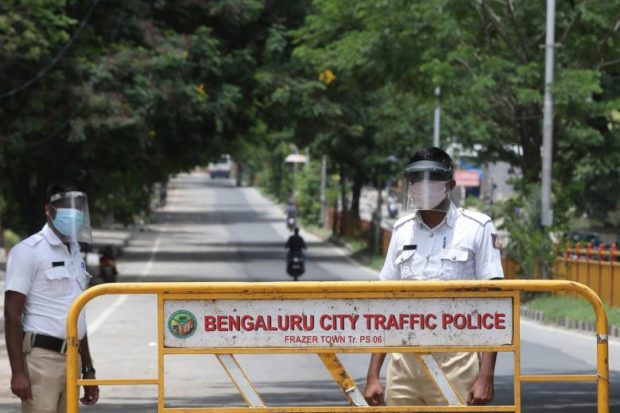Once-model states suffer response fatigue as COVID-19 surges in India

Policemen stand at a barricade in Bangalore, India, on July 5, 2020. EPA-EFE via The Straits Times/Asia News Network
BANGALORE — Clad in personal protective gear, Dr Taha Mateen is seen standing in an intensive care unit for Covid-19 patients in HBS hospital in Bangalore.
Facing the camera, he says: “I am getting calls from people saying their fathers are breathless, their daughters are breathless and they are not able to find beds in Bangalore.”
The machines beep around him. “Look around me. I have beds, I have oxygen beds, I have ventilators, I have all the equipment. I have another 30 beds like this but I don’t have doctors working here. Please, I need you for six hours a day. It is my fervent request,” he says in a voice choking in emotion.
Dr Mateen’s video went viral on Sunday (July 5) as it captured the exhaustion, acute shortages and chaos in Indian healthcare system as the country crosses its 720,000 Covid-19 cases.
The city of Bangalore, where Dr Mateen works, was a model for the response to Covid-19 in India just last week. But infections have doubled in the first six days of July, crossing 10,000. With about 1,000 new infections a day, the famed tech city is now gripped by confusion about bed availability, disappearing medical staff, and falling rates of testing.
Article continues after this advertisementOn Tuesday, India’s death toll surpassed 20,000. The rate of both new Covid-19 infections and deaths are rising at the fastest pace in three months as 1.3 billion people emerge from a nationwide lockdown that left tens of thousands without jobs and closed businesses.
Article continues after this advertisementThe Mumbai and Delhi metropolises are still the worst affected, but regions that were hailed as great examples for the response to the pandemic just a week ago are now struggling with fresh surges.
Karnataka’s leaders have been blaming returnees for the spike, but its own data say they constitute only 4 percent of cases. Health officials say overcrowding in poor neighborhoods, lack of social distancing in workplaces and increasing transmission in hospitals contributed to the rise in cases in Bangalore.
Dr C. N. Manjunath, a member of Karnataka’s Covid-19 task force said: “Contact tracing has also slipped with the large numbers, so a lot of asymptomatic people are walking around.”
Health authorities in the state also temporarily stopped sharing details on the source of infections of new cases in their daily Covid-19 bulletins, undercutting their own aim to be transparent on the spread of the coronavirus, which causes the disease.
Insisting that another lockdown will only postpone an inevitable growth in infections, Karnataka’s leaders are instead bolstering healthcare facilities. A 10,000-bed Covid-19 care centre has been opened and private hospitals reluctant to offer their beds have been urged to comply with state directions. A dashboard with real-time data about hospital bed availability is in the works.
To address the shortfall of healthcare professionals, Karnataka has raised the pay of doctors on contract in government hospitals and extended the services of those retiring this year. Medical education minister K. Sudhakar said officials were mulling on deploying medical and nursing students to provide basic care to asymptomatic Covid-19 patients in Bangalore. The state is also offering extra marks for medical graduates enrolled to write postgraduate exams if they work in caring for such patients.
The neighboring state of Kerala, which received international praise for its early and rigorous response to the pandemic that began with its – and India’s – first case on January 30, is also showing signs of response fatigue.
“We do triple the work we used to before the pandemic. We haven’t got even a week’s break since February and it is stressful. Everyone who has doubts about a cough and fever, or how to be in quarantine calls us. If we take our eyes off them, immediately there will be a cluster. So we feel guilty to rest, and go on and on,” said Ms Preetha, a health worker and local government representative in Kerala’s Kannur district.
To ease the pressures on an exhausted health machinery, the Kerala government on Monday (July 6) imposed a week-long lockdown in the state capital, Thiruvananthapuram, and in some areas of Malappuram district where the majority of residents have returned home from the Middle East. Chief Minister Pinarayi Vijayan is also working from home.
With 193 new Covid-19 cases reported on Monday, Kerala has over 5,600 infections and 28 deaths. Around 160,000 people are under observation in home and institutional quarantine.
“Rather than severe cases, over 95 percent of infected people are in the mild category, so apart from the dedicated Covid-19 critical care hospital in every district, there will be two first line care centers,” said Dr Amar Fettle, a key member of the state’s task force dealing with the pandemic.
In addition to an existing helpline, the state has launched a helpline for online and phone consultations with doctors. “This will reduce unnecessary arrivals in the hospital of people with mild symptoms and avoid exposure,” said Dr. Fettle.
Kerala has amended the state epidemic control law social distancing and the wearing of masks mandatory for a year. Fines for not wearing masks have also been increased from 200 rupees (S$4) to 10,000 rupees.
For more news about the novel coronavirus click here.
What you need to know about Coronavirus.
For more information on COVID-19, call the DOH Hotline: (02) 86517800 local 1149/1150.
The Inquirer Foundation supports our healthcare frontliners and is still accepting cash donations to be deposited at Banco de Oro (BDO) current account #007960018860 or donate through PayMaya using this link.